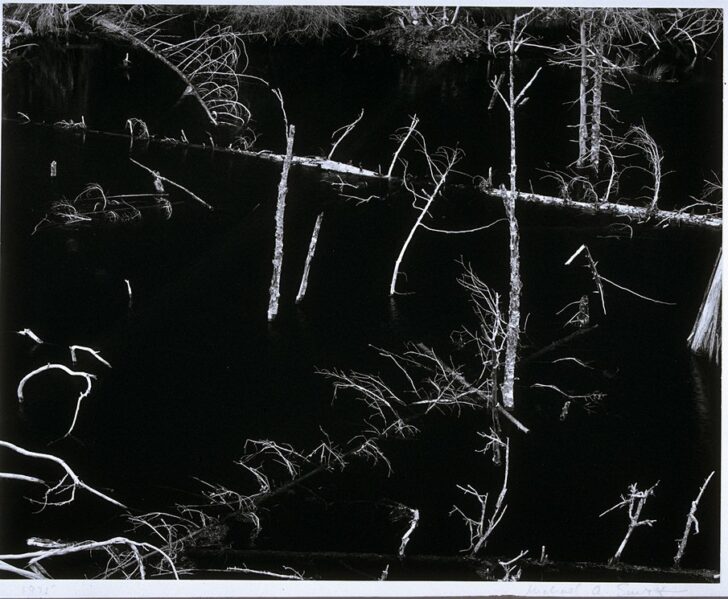Near Blue River, British Columbia
Michael A. Smith

Description
Flip Your Field – Photography from the Collection
Intro Wall Text
The photographs presented here, in two contrasting displays, were selected from the UMMA’s vast holdings. They present the viewer with an opportunity to see two distinctly different approaches to the art of the photograph. On this wall is a set of relatively straightforward, yet incredibly diverse, representations of the same subject. Here, photographic technique presumes the truth of the image. The display on the perpendicular wall is a selection of photographic works pushed by the artists in a variety of creative directions. Inventive and expressive in nature, they illuminate the intervention of artistic vision into the photographic process.
As an artist I was struck by the breadth and size of UMMA’s remarkable collection—every theme that has interested artists over time is represented. As I looked through the many photographs, my instinct was to group together images of trees, a subject close to our immediate environment and related to my own work. Collecting photographs of trees was never an intentional strategy of the museum. The large number of such images among its extensive holdings is rather the result of the abiding interest of photographers in the subject, evidenced throughout the history of the medium.
As a grouping, these photographs demonstrate what the medium has from its beginning done so well—captured the “fact” of a place or event or thing. Yet within this one subject, the range of imagery is quite broad. The tight arrangement here allows us to see the subject as a whole, while also inviting us to compare the artists’ individual visions. For example, compare the gnarled tree trunk in the Ansel Adams image to the simplicity of the single tree on a beach in the photograph by Elliott Erwitt.
Juxtaposed to the tree arrangement is the adjacent wall with very different photographic images, carefully spaced and arranged in a more conventional manner. These are images derived through artistic innovation, and in some cases traditional photography is only part of the picture—other technical strategies are also at play. These photographs are expressive of each individual artist’s point of view, often taking photographic techniques in new and experimental directions. Most were completed in the darkroom and studio before the ease of digital manipulation so prevalent today. Consider, for instance, Blythe Bohnen’s self-portrait, a photograph capturing motion and intentional blurring of the focus, and contrast it with Lesley Dill’s “White Poem Figure (The Soul Has Moments of Escape),” an image that challenges the notion of what constitutes a photograph.
With the abundance of cell phone cameras, the photograph has become even more a part of our lives. The ease with which we can capture “real life” images, and at the same time manipulate those images digitally, means that the creative work of photographers in the past is, in a sense, now embedded in our everyday experience. Together, the two distinct installations that constitute this exhibition recall the purity of the traditional photograph while also presenting works in which creative experimentation has expanded the boundaries of the medium.
Larry Cressman
Guest Curator
Professor of Art,Residential College and Penny W. Stamps School of Art & Design
The UMMA Flip Your Field series asks noted University of Michigan faculty members to consider artwork outside their field of specialization in order to guest curate an exhibition using works from UMMA's renowned collection. The UMMA Flip Your Field series is generously supported by the Andrew W. Mellon Foundation.
26) Michael Smith
United States, born 1942
Near Blue River, British Columbia
1975
Gelatin silver print
Museum Purchase, 1976/1.238
Usage Rights:
If you are interested in using an image for a publication, please visit https://umma.umich.edu/request-image/ for more information and to fill out the online Image Rights and Reproductions Request Form.